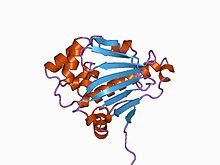GHKL domain
| Histidine kinase-, DNA gyrase B-, and HSP90-like ATPase | |||||||||||
|---|---|---|---|---|---|---|---|---|---|---|---|
 Structure of the N-terminal domain of the yeast Hsp90 chaperone.[1] | |||||||||||
| Identifiers | |||||||||||
| Symbol | HATPase_c | ||||||||||
| Pfam | PF02518 | ||||||||||
| InterPro | IPR003594 | ||||||||||
| SMART | HATPase_c | ||||||||||
| SCOP2 | 1ei1 / SCOPe / SUPFAM | ||||||||||
| CDD | cd00075 | ||||||||||
| |||||||||||
The GHKL domain (Gyrase, Hsp90, Histidine Kinase, MutL) is an evolutionary conserved protein domain.[2] It is an ATPase domain found in several ATP-binding proteins such as histidine kinase, DNA gyrase B, topoisomerases,[3] heat shock protein HSP90,[4][5][6] phytochrome-like ATPases and DNA mismatch repair proteins.
More information about this protein can be found at Protein of the Month: DNA Topoisomerase.[7]
Structure
[edit]The fold of this domain consists of two layers, alpha/beta, which contain an 8-stranded mixed beta-sheet.[2]
Subfamilies
[edit]- Heat shock protein Hsp90, N-terminal
- Sensor histidine kinase NatK, C-terminal domain
Members
[edit]- BCKDK
- HSP90AA1, HSP90AB1, HSP90B1
- MLH1, MLH3, MORC1, MORC2, MORC3, MORC4
- PDK1, PDK2, PDK3, PDK4
- PMS1, PMS2, PMS2L1, PMS2L11, PMS2L3, PMS4L
- TOP2A, TOP2B
- TRAP1, TRRAP
References
[edit]- ^ Prodromou C, Roe SM, Piper PW, Pearl LH (June 1997). "A molecular clamp in the crystal structure of the N-terminal domain of the yeast Hsp90 chaperone". Nat. Struct. Biol. 4 (6): 477–82. doi:10.1038/nsb0697-477. PMID 9187656. S2CID 38764610.
- ^ a b Dutta R, Inouye M (January 2000). "GHKL, an emergent ATPase/kinase superfamily". Trends Biochem. Sci. 25 (1): 24–8. doi:10.1016/S0968-0004(99)01503-0. PMID 10637609.
- ^ Bellon S, Parsons JD, Wei Y, Hayakawa K, Swenson LL, Charifson PS, Lippke JA, Aldape R, Gross CH (May 2004). "Crystal Structures of Escherichia coli Topoisomerase IV ParE Subunit (24 and 43 Kilodaltons): a Single Residue Dictates Differences in Novobiocin Potency against Topoisomerase IV and DNA Gyrase". Antimicrob. Agents Chemother. 48 (5): 1856–64. doi:10.1128/AAC.48.5.1856-1864.2004. PMC 400558. PMID 15105144.
- ^ Immormino RM, Dollins DE, Shaffer PL, Soldano KL, Walker MA, Gewirth DT (October 2004). "Ligand-induced conformational shift in the N-terminal domain of GRP94, an Hsp90 chaperone". J. Biol. Chem. 279 (44): 46162–71. doi:10.1074/jbc.M405253200. PMID 15292259.
- ^ Roe SM, Ali MM, Meyer P, Vaughan CK, Panaretou B, Piper PW, Prodromou C, Pearl LH (January 2004). "The Mechanism of Hsp90 regulation by the protein kinase-specific cochaperone p50(cdc37)". Cell. 116 (1): 87–98. doi:10.1016/S0092-8674(03)01027-4. PMID 14718169. S2CID 797232.
- ^ Wright L, Barril X, Dymock B, Sheridan L, Surgenor A, Beswick M, Drysdale M, Collier A, Massey A, Davies N, Fink A, Fromont C, Aherne W, Boxall K, Sharp S, Workman P, Hubbard RE (June 2004). "Structure-activity relationships in purine-based inhibitor binding to HSP90 isoforms". Chem. Biol. 11 (6): 775–85. doi:10.1016/j.chembiol.2004.03.033. PMID 15217611.
- ^ McDowall J (2006). "DNA Topoisomerase". Protein of the month. InterPro.
